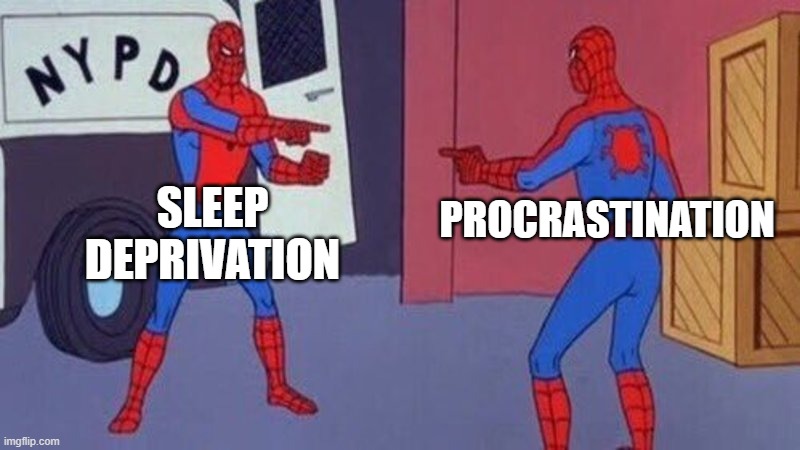Sleep deprivation and procrastination is a chicken and egg problem – what comes first? There is no meaningful starting point. But you can fix your sleep and automatically lower the intensity of procrastination.
Sleep deprivation (+ low-quality sleep) and procrastination are in a positive feedback loop. One increases the other, whichever happens first. But, because of that one of them might even solve the other to an extent. Depending on what’s more convenient to manage, fixing sleep might be the easier way to reduce procrastination.
And, the reason lies in 2 facts:
- Procrastination is an emotional regulation problem (usually caused by fear of failure, lack of tolerance for negative emotions, not valuing long-term rewards, impulse control, etc.).
- Two of sleep’s many functions[1] are to manage emotions and replenish resources to self-regulate.

At the broadest level, sleep has a restoration function. It replenishes resources that get depleted by being alive and doing things. One such resource is a self-regulatory resource. Self-regulation is the capacity to manage emotions and behavior to adjust to the world and achieve goals. This takes willpower, biological resources like nutrients, cognitive resources like learning, and behavioral resources like intentions to start an action.
Since sleep deprivation and sleep disturbances (not falling asleep after getting disturbed, regular waking, restlessness) don’t let the body restore its resources well enough, procrastination increases. The link is simple – procrastination occurs because of lacking emotional regulation like tolerating boredom, putting effort without rewards, managing fears, etc., and emotional regulation requires self-regulatory resources, which good sleep provides.
Procrastination is 1 symptom of sleep disturbances (among many other causes). Fixing sleep can fix procrastination, at least a little bit. Share on XThis is seen at a large scale when people’s bedtimes are not well aligned to their work timings. Like having a 9 to 5 job, but sleep starts at 1 am the previous night (roughly 6.5 hours of sleep here). This leads to chronic sleep deprivation only because the 9 to 5 job can’t accommodate late sleeping patterns.
Researchers say people have different chrono-types which describe their natural wake-sleep timings. Night owls and early risers are opposite chrono types. People often choose jobs that suit their chronotype or regulate their sleep patterns to fit job requirements (for most of us, school timings do this for us, but college disrupts it). But while adjusting sleep, they often experience a “social sleep lag” – The chronotype is not aligned with the expected sleep routine for a particular way of life. This social sleep lag increases procrastination.
Research has verified[2] all of this. In their study, 154 workers completed a sleep diary and researchers measured their procrastination via questionnaires. They found those who sleep better procrastinate less, and those who get more inadequate sleep because of the social sleep lag, procrastinate even more. Another study confirms the mechanism[3]. Researchers tracked 66 workers’ energy, willpower, procrastination, and sleep quality and found those who slept better and had their circadian rhythm match job requirements had more energy and willpower and showed less procrastination the next day. The opposite was true as well – on days they didn’t sleep well and their circadian rhythms were misaligned with their job requirements, they tended to procrastinate more.
Here’s the core problem. One function of sleep is to dilute emotions and make them more manageable. When you are sleep-deprived, for a day, or even chronically, the amygdala functions poorly. The amygdala is the brain region that processes emotions. It has 3 important functions in getting rid of procrastination-related thoughts – amygdala reactivity, amygdala up-regulation, and amygdala down-regulation.
High amygdala reactivity can make a person sensitive and more prone to negative thoughts. Amygdala upregulation can make a person’s emotions more intense and rigid. Now, sleep reduces amygdala reactivity and downregulates it[4]. So, in effect, good sleep keeps emotions in check and makes them less intense. That means sleep deprivation makes your emotions go out of control.
Fun fact, disturbed sleep and lack of REM sleep can make you feel more embarrassed about something[5] you did the previous day. And being embarrassed generally means feeling motivated to AVOID something – aka procrastination and withdrawing.
Few sleeping hours (under 7 hours for adults), irregular wake-up and bedtime hours, frequent disturbances, not feeling rested after waking up, low volume of REM and deep sleep, etc., are all signs of a low quality of sleep.
Now let’s look at the flip side.
Procrastination causes additional stress and negative emotions like guilt because procrastinators know they shouldn’t be procrastinating. Delaying important things also becomes a habit before bedtime, where sleep itself is procrastinated. Both are technically a failure of emotional regulation because a person can’t assign adequate value to the task and commit to it.
So 2 problems emerge:
- Procrastination amplifies negative emotions and stress: Stress and negative emotions are known[6] to keep people awake, and they often contribute to further mental health problems like insomnia and depression. A core theme of these negative emotions is “regret” of some kind. Research verifies[7] that regret-centered thoughts delay sleep. In some cases, the intrusive thoughts about not getting work done or imagining a doomsday scenario caused by failure are itself the anxiety. And, when it’s anxiety, the body is in a high arousal mode (most call it the fight or flight response) which makes sleeping a lot more difficult.
- Habitual procrastination leads to habitual bedtime procrastination: The concept of bedtime procrastination[8] is a habitual delaying of bedtime even when there is no need to. Most people engage in light fun activities before bedtime while they procrastinate sleep. When a whole day goes with lots of procrastination, the guilt + negative emotions build up, so a person requires a “restoring” activity where they experience rewards to repair their mood from the negative emotions. Sleep does restore, but a person doesn’t experience the rewards – so they choose to binge-watch or scroll on Instagram/TikTok for hours. They consume engaging media to feel better and relax and then sleep.
Let’s tie this together by looking at why we sleep in the first place. Researchers have proposed multiple theories which you can explore in this paper[9]. I’ll highlight 4 of their insights.
- Restoration: We sleep to restore the damage done to the brain & body caused by staying up and working. This is a direct effect of our ape-like ancestors’ foraging and hunting behaviors.
- Body activation: The brain sleeps to activate, select, and instruct our motor and pre-motor neurons for future actions based on our past learning. These neurons send the source signals to initiate body movement and any action. Procrastination can often stem from “the body giving up” which is a feeling coming from the motor and pre-motor neurons not being prepared to do work.
- Scheduling: Sleep schedules the things we have to do and enables resources to do them the next day. It creates an energy budget and allocates energy for specific things like cognitive work, physical movement, managing diseases, etc.
- Learning: Everyday learning strains neural circuits (neuroplasticity) and exhausts the body. For the learning to consolidate, it needs time which sleep gives. Sleep runs automatic processes that restore the exhaustion and consolidate that learning overnight. As a result, we feel more energetic the next day and more capable of using that learning.
So, the function of sleep is to directly regulate behavior and prepare the body to take action. Which, by definition, is the opposite of procrastination. More specifically, the function of sleep is to give the brain resources that automatically reduce the “symptom” called procrastination. This way, sleep becomes a tool to reduce procrastination.
Takeaway: Improve your sleep hygiene so your brain can automatically plan your work as it is the sleep’s default function and also keep your emotions in check.
Related: The basic actions to take to improve sleep patterns
Sources
[2]: https://onlinelibrary.wiley.com/doi/abs/10.1002/job.2084
[3]: https://bpspsychub.onlinelibrary.wiley.com/doi/abs/10.1111/joop.12191
[4]: https://www.ncbi.nlm.nih.gov/pmc/articles/PMC3747835/
[5]: https://www.sciencedirect.com/science/article/pii/S0960982219307614
[6]: https://academic.oup.com/sleep/article/16/2/128/2749337
[7]: https://link.springer.com/article/10.1007/s10608-013-9532-5
[8]: https://www.frontiersin.org/journals/psychology/articles/10.3389/fpsyg.2014.00611/full
[9]: https://www.aimspress.com/article/10.3934/Neuroscience.2015.3.155

Hey! Thank you for reading; hope you enjoyed the article. I run Cognition Today to capture some of the most fascinating mechanisms that guide our lives. My content here is referenced and featured in NY Times, Forbes, CNET, and Entrepreneur, and many other books & research papers.
I’m am a psychology SME consultant in EdTech with a focus on AI cognition and Behavioral Engineering. I’m affiliated to myelin, an EdTech company in India as well.
I’ve studied at NIMHANS Bangalore (positive psychology), Savitribai Phule Pune University (clinical psychology), Fergusson College (BA psych), and affiliated with IIM Ahmedabad (marketing psychology). I’m currently studying Korean at Seoul National University.
I’m based in Pune, India but living in Seoul, S. Korea. Love Sci-fi, horror media; Love rock, metal, synthwave, and K-pop music; can’t whistle; can play 2 guitars at a time.



























